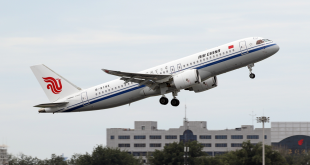Published: July 11,2023

Coffee exporters in Ethiopia, known as the birthplace of Arabica coffee, are enjoying the rising coffee market in China as an increasing number of Chinese consumers tend to value Ethiopian coffee.
The growing demand for Ethiopian coffee in China with its fastest-growing economy has presented a potential market for coffee exporting countries such as Ethiopia, said Abdullah Bagersh, general manager of S.A. Bagersh Private Limited Company (PLC) in a recent interview with Xinhua.
“Over the last 5 to 10 years, we are seeing growing demand for Ethiopian coffee in China, and that has created one of the most promising coffee markets in the world,” said Bagersh.According to data from the International Coffee Organization, China’s annual coffee consumption has expanded by an average rate of more than 15 percent over the past decade, while the international growth rate of coffee consumption stands at 2.2 percent.
Bagersh said the Chinese people, especially the youth, are shifting to drinking coffee, a situation propelling Chinese coffee importers to establish business relations with their Ethiopian counterparts.
Jemal Abrar, coffee quality control deputy manager at Mullege Coffee Export PLC, one of the leading coffee exporting firms in Ethiopia, said Ethiopian coffee is winning growing demand in China and surrounding markets.”We participated in the second China-Africa Economic and Trade Expo last year. Since then, we have enjoyed growing market share in China and exploited new market opportunities,” Abrar told Xinhua.
The coffee market has been evolving over the years in China where tea has been a traditional drink, said Gizat Worku, chief executive officer of the Ethiopian Coffee Exporters Association, which is engaged in promoting Ethiopian coffee in the international market.”China is an emerging market for Ethiopian coffee exporters. Any businessman cannot ignore China whose market potential has turned out to be rich over time,” Worku said.
According to Worku, Ethiopia’s coffee export volume to China has seen impressive growth with an export volume of 4,200 tonnes in the 2019/2020 Ethiopian fiscal year, 8,400 tonnes in the 2020/2021 fiscal year, and 11,200 tonnes of coffee last fiscal year which ended on July 7, 2022.Worku is optimistic that within the coming 10 years, more Ethiopian coffee might go to China and his association is ready to satisfy the growing demand there with timely delivery of the specialty coffee which he referred to as “de facto organic.”
“The Chinese population is there-well over 1.3 billion people. China’s economy is becoming skyrocketing. It is a new emerging market, so the biggest market there is automatic,” said Worku.
Indicating that Ethiopian coffee exporters have exhibited their products in different cities in China, Worku said the association is jointly working with the Chinese government and coffee buyers to better exploit the Chinese market through online meetings and aggressive promotion with the help of the Ethiopian Embassy in China.
Ahadu Woubshet, managing director of Moyee Coffee Roasting PLC, another coffee exporter in Ethiopia, said his company has enjoyed growing sales from the expanding coffee market in China. Woubshet said coffee drinking culture in China is growing from time to time and his company is enjoying increasing sales volume from the Chinese market.”I am sure China will give a massive opportunity for Ethiopia as the coffee drinking culture is expanding among its people who also start to understand the rich flavors and varieties of the Ethiopian coffee,” Woubshet said. “If you look at the Chinese market, it is very big and has been doubling from year to year. So we are happy that the Chinese market is giving a lot of opportunities to Ethiopia.”
The Ethiopian Coffee and Tea Authority recently announced that the East African nation earned 1.1 billion U.S. dollars between June 2022 and April 2023, and China became the seventh-largest importer of Ethiopian coffee during the period.According to information obtained from the Ethiopian authority, coffee products generate 24 percent of the country’s export income.
Xinhua
 Africa -China Review Africa -China Cooperation and Transformation
Africa -China Review Africa -China Cooperation and Transformation
